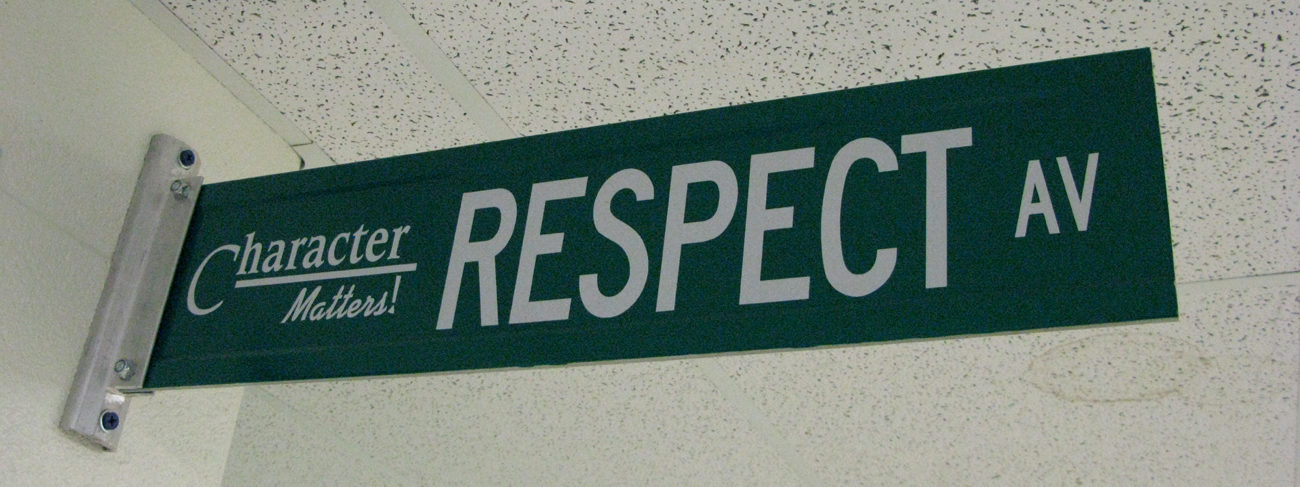
19 Feb R-E-S-P-E-C-T
I have to be really honest. Every time I hear about a problem here or there with some client or court who does not want to pay a fair compensation to the interpreter, or someone wondering why the interpreter needs to prep for an assignment or bypassing the credentialed and qualified interpreter for one with no qualifications whatsoever, I feel deeply offended. I guess it’s what you would call vicarious indignation. Even if it is not happening to me, I feel the ripple effects extending far and wide and definitely affecting my professional sensibilities. This widespread lack of respect for interpreters has been around for the entire time I have been a professional interpreter, which is over four decades. You’d think that by now things would have changed, but they just seem to be getting worse in many important ways.
I am not going to itemize the many fronts where interpreters are battling right now for better pay and improved work conditions, but it is encouraging to see all the groups joining forces in different parts of the country and “taking up arms,” metaphorically speaking. The undercurrent is one of disrespect for the individual interpreters and the interpreting profession as a whole. There is no other explanation for the way interpreters are being treated by language-service consumers. Why is that? Why do end users like court, hospital, or school administrators think they can dictate what an interpreter’s service is worth? Well, I think there is enough blame to go around, and I do not hold interpreters harmless, including me. For too long we have limited an interpreter’s “education” to the three basic skills and the most elementary knowledge of specialized terminology, with a “sprinkle” of ethics. The fact is that such training was and still is sorely lacking in the type of knowledge that clearly sets a professional apart from a skilled technician. There are very few educational opportunities for interpreters in all domains—education, healthcare, and law—that foster critical thinking and give interpreters the knowledge-based tools to make judgment calls based on solid theoretical foundations rather than intuition.
 We also have “codes of ethics” galore in every state and every professional association that misdirect an interpreter’s performance towards some distorted idea of what interpreting means. Transferring meaning from one language to another cannot be done without some sort of addition or omission, because we do not transfer meaning word for word. This straightjacket was put in place because interpreters were not expected to have a sufficient structural knowledge about the languages interpreted to make judgment calls about which syntactic and semantic constituents of speech could be rendered differently and still remain faithful to the source language’s message.
We also have “codes of ethics” galore in every state and every professional association that misdirect an interpreter’s performance towards some distorted idea of what interpreting means. Transferring meaning from one language to another cannot be done without some sort of addition or omission, because we do not transfer meaning word for word. This straightjacket was put in place because interpreters were not expected to have a sufficient structural knowledge about the languages interpreted to make judgment calls about which syntactic and semantic constituents of speech could be rendered differently and still remain faithful to the source language’s message.
We did the best we could with what we had four decades ago, but in doing so we unwittingly relinquished our own agency, our own power to shape our profession within the parameters of each domain: education, healthcare, law. I believe the time has come for us to take back ownership of our profession. I also believe we can do that only by raising the bar in the sort of knowledge we bring to the table. We cannot be “experts” unless we are knowledgeable about language structure and function, language processing in our brains, and the complexities of the work we do. It is up to each one of us. Just like we learn about specialized terminology by researching and creating our own glossaries, we can also learn about the rules of grammar and the essential principles of semantics and pragmatics. It is up to us because there are no graduate programs in judiciary interpreting, or healthcare, or education interpreting. There is an amazing world of “universities without walls” on the internet where anyone can find any subject matter and learn on their own schedule, based on their own needs. It is up to each one of us to become savvy online researchers and master the essential “tools of the trade” that will empower us to assert our place in the universe of work scenarios in which our services are needed and command the respect we rightfully deserve.
Speaking of which, here are a few sources to get you started on your self-guided learning journey:
Syntax
https://www.youtube.com/watch?v=DrqILBzGZVE (Oregon State University)
Semantics
https://www.youtube.com/watch?v=e_3h0fB8Rhg (one of my favorites, a professor at the University of New Mexico, Evan Ashworth. Here’s more information about him: https://cjdept.unm.edu/people/faculty/profile/evan-ashworth.html. I love all his videos on linguistics, so I recommend looking for more of his lectures.)
https://www.youtube.com/watch?v=8QZWx_XAO1w (The Virtual Linguistics Campus)
Pragmatics
https://www.youtube.com/watch?v=dsPswzOBsK0&list=RDCMUC4NHPS-ApMmYuguXTCZGWPw&index=2
Linguistic Relativity
https://www.youtube.com/watch?v=cwPbDNBFVrc&list=RDCMUC4NHPS-ApMmYuguXTCZGWPw&index=26
For the millennial learners: (this lecturer may be more “relatable”)
https://www.youtube.com/watch?v=sGWpbDI11Ik
https://www.youtube.com/watch?v=I9RPueD8wGs
Also:
Noam Chomsky on The Concept of Language: https://www.youtube.com/watch?v=hdUbIlwHRkY (University of Washington in Seattle)
Noam Chomsky on The Structure of Language: https://www.youtube.com/watch?v=E3U6MsdBalg&list=RDCMUCHuLYgw4dGbC2BuZQqPWV1g&start_radio=1&rv=E3U6MsdBalg&t=49
Noam Chomsky on The Function of Language: https://www.youtube.com/watch?v=TzzuPMA8s7k&list=RDCMUCHuLYgw4dGbC2BuZQqPWV1g&index=2
John Searle on The Philosophy of Language: https://www.youtube.com/watch?v=Uk5pIzCNOzU&t=372s (another one of my favorites; he wrote the book titled Speech Acts. This video is the first in a series of lectures at UC Berkeley.)

Janis Palma has been a federally certified English<>Spanish judiciary interpreter since 1981. She recently obtained her Master in Legal Studies (MLS) degree from Arizona State University and holds an M.A. in literature and history from the Centro de Estudios Avanzados de Puerto Rico y el Caribe. Her experience includes conference work in the private sector and seminar interpreting for the U.S. State Department. She has been a consultant for various higher education institutions, professional associations, and government agencies on judiciary interpreting and translating issues. She worked as an independent contractor for over twenty years in federal, state, and immigration courts around the U.S. before taking a full-time job. Janis joined the U.S. District Courts in Puerto Rico as a staff interpreter in April 2002 and retired in 2017. She now lives in San Antonio, Texas, embracing the joys of being a grandmother. She also enjoys volunteering for her professional associations, has been on the SSTI and TAJIT Boards, and is the past Chair of the NAJIT Board of Directors. Contact: palmajanis88@gmail.com.
Featured image (cropped) “Sign in hallway Respect August 25, 2008” by user ChinaFlag at Wikimedia Commons; photo in the public domain. Text-body photo (cropped) “Statues of Honour Grand Staircase” by user Livioandronico2013 at Wikimedia Commons, under a CC BY-SA 4.0 license.

Nicely put. Thanks for the references.
Thank you, Carlos.
Janis, THANK YOU! Let me add a thought or an intuition. Perhaps the no omissions or additions comes from court reporting. Although, I’m not familiar with the history of our profession and how the code of ethics was developed, the fact that no college degree is required to take the exam, just like in court reporting makes me wonder how it came to be. I have been asked way too many times “Do you do verbatim?” by attorneys. It would be interesting to look at their code of ethics at some point. Wonderful post!
Hi Sandra! You may be right about court reporters serving as some sort of template for the interpreters’ code of ethics. There is an article by Holly Mikkelson that I just love and highly recommend on the issue of “verbatim interpreting”: Mikkelson, Holly. (1999) Verbatim Interpretation: An Oxymoron. Available at https://acebo.myshopify.com/pages/verbatim-interpretation-an-oxymoron.
Janis, I was excited to read the paragraph about interpreters being put into a straightjacket because of the incomplete knowledge of grammar, syntax, etc. interpreter bring to the job. I also liked that you mentioned that it is OK (breathe, everyone!) to omit and to add words or phrases if that will produce the equivalent meaning in the target language. Thank you for the reflection and the resources.
Janet, as always, you are spot on! Educating ourselves is key to our own empowerment. Thanks for the suggestions!